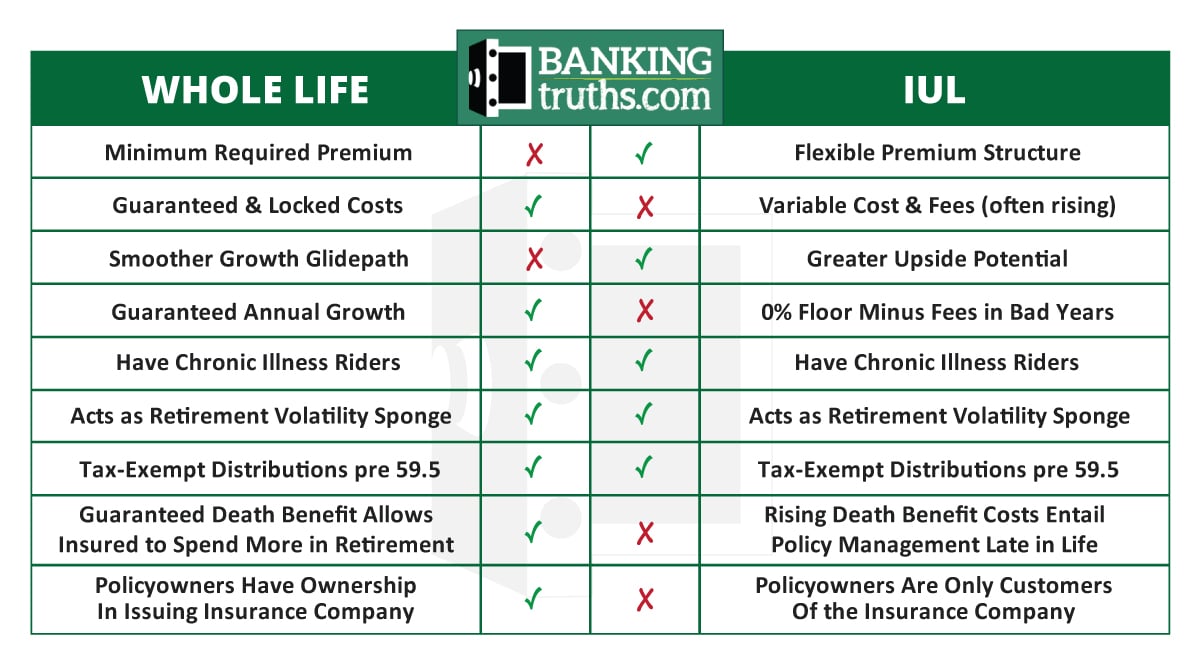All Categories
Featured
Table of Contents
1), often in an attempt to defeat their category standards. This is a straw man debate, and one IUL folks love to make. Do they compare the IUL to something like the Lead Overall Stock Market Fund Admiral Shares with no tons, an expense proportion (EMERGENCY ROOM) of 5 basis points, a turn over proportion of 4.3%, and an exceptional tax-efficient document of circulations? No, they compare it to some horrible actively taken care of fund with an 8% load, a 2% EMERGENCY ROOM, an 80% turn over proportion, and a terrible document of temporary funding gain circulations.
Mutual funds usually make annual taxable distributions to fund proprietors, even when the worth of their fund has decreased in value. Shared funds not only require income coverage (and the resulting yearly taxes) when the common fund is rising in value, yet can additionally impose earnings taxes in a year when the fund has gone down in value.
That's not exactly how shared funds function. You can tax-manage the fund, harvesting losses and gains in order to decrease taxable distributions to the capitalists, yet that isn't somehow going to alter the reported return of the fund. Just Bernie Madoff types can do that. IULs avoid myriad tax obligation traps. The ownership of shared funds may call for the shared fund owner to pay projected tax obligations.

IULs are simple to position so that, at the owner's death, the beneficiary is not subject to either earnings or estate tax obligations. The exact same tax reduction techniques do not function virtually also with shared funds. There are numerous, often pricey, tax obligation traps connected with the moment purchasing and selling of mutual fund shares, catches that do not relate to indexed life Insurance coverage.
Possibilities aren't extremely high that you're mosting likely to be subject to the AMT due to your common fund circulations if you aren't without them. The rest of this one is half-truths at ideal. While it is real that there is no income tax due to your heirs when they acquire the proceeds of your IUL policy, it is additionally true that there is no income tax obligation due to your heirs when they inherit a mutual fund in a taxed account from you.
Index Life Insurance Companies
There are better means to stay clear of estate tax obligation issues than buying financial investments with reduced returns. Common funds may trigger earnings taxation of Social Safety benefits.

The development within the IUL is tax-deferred and might be taken as tax obligation free income via fundings. The policy owner (vs. the shared fund manager) is in control of his/her reportable income, thus allowing them to decrease or even remove the tax of their Social Security advantages. This one is fantastic.
Below's one more minimal issue. It holds true if you purchase a mutual fund for claim $10 per share prior to the circulation date, and it distributes a $0.50 distribution, you are then going to owe tax obligations (probably 7-10 cents per share) despite the fact that you have not yet had any gains.
But in the long run, it's truly concerning the after-tax return, not how much you pay in taxes. You are mosting likely to pay more in tax obligations by utilizing a taxable account than if you acquire life insurance policy. You're additionally most likely going to have even more cash after paying those tax obligations. The record-keeping requirements for having common funds are substantially much more complex.
With an IUL, one's records are kept by the insurance provider, copies of annual statements are mailed to the owner, and circulations (if any type of) are totaled and reported at year end. This set is additionally kind of silly. Obviously you need to keep your tax documents in situation of an audit.
Universal Life Vs Term Insurance
All you need to do is push the paper right into your tax folder when it shows up in the mail. Rarely a factor to acquire life insurance policy. It's like this guy has never bought a taxed account or something. Common funds are frequently component of a decedent's probated estate.
In addition, they are subject to the hold-ups and expenditures of probate. The earnings of the IUL policy, on the other hand, is constantly a non-probate circulation that passes beyond probate straight to one's called recipients, and is as a result exempt to one's posthumous financial institutions, unwanted public disclosure, or similar delays and prices.
Medicaid incompetency and lifetime income. An IUL can give their owners with a stream of earnings for their entire lifetime, regardless of how long they live.

This is beneficial when arranging one's affairs, and transforming assets to revenue prior to an assisted living facility confinement. Common funds can not be transformed in a similar way, and are often considered countable Medicaid assets. This is one more foolish one promoting that bad individuals (you understand, the ones who require Medicaid, a federal government program for the poor, to pay for their nursing home) must use IUL rather than shared funds.
No Lapse Universal Life
And life insurance policy looks terrible when contrasted relatively against a pension. Second, people that have cash to buy IUL above and past their pension are mosting likely to have to be dreadful at handling cash in order to ever qualify for Medicaid to pay for their assisted living facility expenses.
Persistent and incurable illness biker. All policies will certainly permit an owner's easy accessibility to cash money from their plan, often forgoing any kind of surrender charges when such individuals endure a significant illness, need at-home care, or become restricted to an assisted living home. Mutual funds do not offer a comparable waiver when contingent deferred sales costs still put on a mutual fund account whose proprietor needs to market some shares to fund the prices of such a stay.
Universal Seguros
You obtain to pay even more for that advantage (rider) with an insurance plan. What a good deal! Indexed universal life insurance policy provides survivor benefit to the beneficiaries of the IUL owners, and neither the proprietor neither the beneficiary can ever before shed cash due to a down market. Mutual funds provide no such assurances or death benefits of any kind of kind.
I definitely do not need one after I reach monetary self-reliance. Do I want one? On standard, a buyer of life insurance pays for the true expense of the life insurance benefit, plus the expenses of the policy, plus the revenues of the insurance coverage firm.
Maximum Funded Insurance
I'm not completely certain why Mr. Morais tossed in the entire "you can not lose money" once more below as it was covered fairly well in # 1. He simply wished to repeat the very best marketing factor for these points I suppose. Again, you do not shed nominal dollars, but you can lose real bucks, as well as face severe possibility expense due to reduced returns.

An indexed global life insurance plan proprietor may trade their plan for a totally various policy without activating revenue tax obligations. A mutual fund owner can stagnate funds from one mutual fund company to one more without marketing his shares at the previous (therefore causing a taxed occasion), and buying brand-new shares at the last, commonly subject to sales charges at both.
While it is true that you can trade one insurance coverage for another, the factor that people do this is that the very first one is such an awful plan that also after purchasing a brand-new one and undergoing the very early, adverse return years, you'll still come out ahead. If they were marketed the appropriate policy the very first time, they should not have any kind of wish to ever trade it and experience the very early, negative return years again.
Latest Posts
Universal Life Insurance Cash Value Calculator
Iul Vs 401k Calculator
Principal Group Universal Life